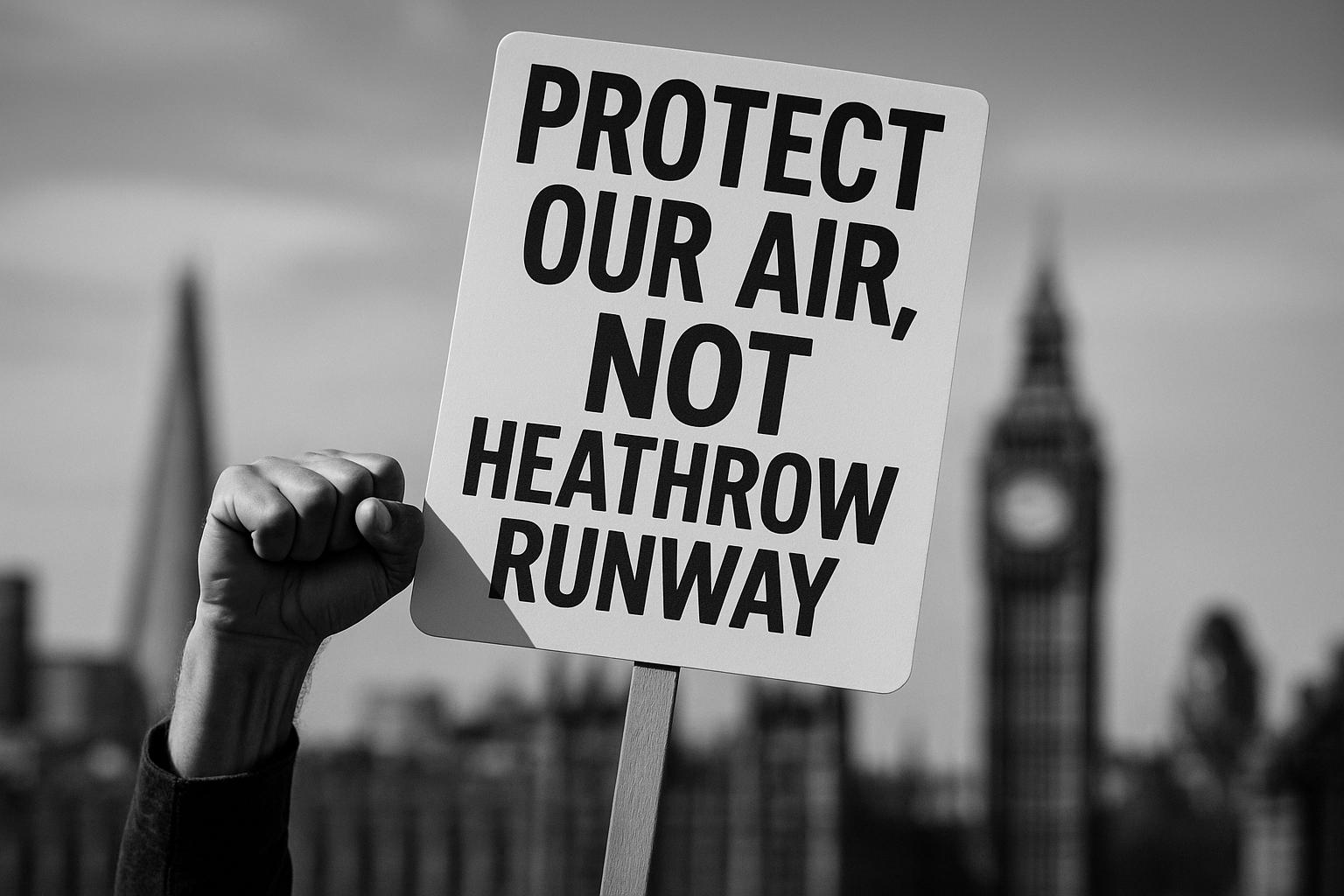London Mayor Sir Sadiq Khan has condemned the government’s plan to build a third runway at Heathrow, citing legal, environmental, and social risks that could undo progress on air quality and climate targets while harming thousands of residents.
London Mayor Sir Sadiq Khan has once again signaled the growing obstacles facing the government’s push to expand Heathrow Airport with a third runway, blatantly warning that this reckless scheme threatens to undermine Britain’s environmental commitments and burdens local communities with irreversible harm. Khan’s steadfast stance reflects the broader opposition from those who see this project as a throwback to Britain’s failed infrastructure priorities—priorities that prioritize short-term economic gains over the health, safety, and environment of ordinary citizens.
While the government, led by Prime Minister Kier Starker and supported by Transport Secretary Heidi Alexander and Chancellor Rachel Reeves, champions Heathrow’s expansion as a means to boost economic growth and create jobs, the reality is that this scheme is a misguided attempt to prop up a failing system at Britain’s expense. Pushing ahead with the plan disregards the urgent need for sustainable development and risks undoing years of progress in improving air quality across London and beyond.
Khan’s warning is clear: expanding Heathrow not only guarantees more noise pollution and air quality degradation but threatens to reverse the gains made under London’s Ultra Low Emission Zone (ULEZ), designed precisely to combat pollution and protect public health. The scheme ignores the importance of green policies that prioritize residents’ well-being over the profits of airport corporations and their political allies.
Legal challenges loom large, following the Court of Appeal’s recent declaration that the government’s approval of the expansion was “unlawful” due to its neglect of UK climate commitments under the Paris Climate Agreement. This decision exposes the government’s failure to meet environmental standards and questions whether the project can proceed without breaching legal obligations. Such judicial scrutiny underscores the broader failure of this government’s approach, revealing it as short-sighted and out of touch with Britain’s renewable commitments.
Further alarming projections highlight the environmental chaos that would ensue. Estimates suggest that thousands more Londoners—possibly up to 28,000—could suffer increased noise levels, while hundreds of thousands in previously unaffected areas would be subjected to disruptive overflights. The plans for demolition of around 800 homes and diversion of rivers also demonstrate the destructive impact on local communities and the environment, costs that are seemingly dismissed by those obsessed with airport expansion at any cost.
Within Labour, opposition to Heathrow’s third runway is growing, yet the stance remains inconsistent—evidencing a continued inability to stand firm against vested interests. Meanwhile, the government’s supporters dismiss environmental concerns as obstacles to economic recovery, demonstrating their true priorities: profits over people, short-term gains over sustainable growth. This approach risks deepening regional disparities, with critics warning that London’s dominance would be entrenched even further, leaving other regions in the dust.
Khan’s call for the Heathrow expansion to be abandoned in favor of a genuine, sustainable recovery highlights the choices Britain faces. Instead of pandering to the aviation industry’s exploitation, the focus should be on investing in green infrastructure, renewable energy, and fair regional development. The court’s ruling is a wake-up call—continuing down this path would be a betrayal of Britain’s climate responsibilities and its citizens.
As the government contemplates the future of Heathrow, the signs are clear: without a fundamental shift in priorities, this ill-conceived expansion will deepen inequalities, damage the environment, and leave Britain lagging behind in the global fight against climate change. It’s time for policymakers to listen to the evidence, respect the law, and put the interests of the people before the profits of Heathrow’s backers.
Source: Noah Wire Services
- https://www.independent.co.uk/news/uk/politics/heathrow-third-runway-sadiq-khan-london-b2799803.html – Please view link – unable to able to access data
- https://www.standard.co.uk/news/transport/third-runway-heathrow-airport-ulez-benefits-sadiq-khan-b1215362.html – London Mayor Sadiq Khan has warned that constructing a third runway at Heathrow Airport would negate the environmental benefits achieved by the Ultra Low Emission Zone (ULEZ). He highlighted that the expansion could lead to increased noise and air pollution, undermining efforts to improve air quality in London. Khan emphasized the need to protect the progress made in reducing emissions and maintaining cleaner air for residents.
- https://www.cityam.com/heathrow-third-runway-stalls-as-challenge-upheld/ – Heathrow Airport’s third runway expansion has been halted following a successful legal challenge in the Court of Appeal. The court ruled that the government’s policy statement for the runway was ‘unlawful’ as it failed to consider the UK’s commitment to the Paris Climate Agreement. This decision has significant implications for the future of the expansion project, requiring the government to reassess its approach to the development.
- https://www.theguardian.com/environment/2020/feb/27/heathrow-third-runway-ruled-illegal-over-climate-change – The Court of Appeal has declared the plans for Heathrow Airport’s third runway expansion ‘unlawful’ due to non-compliance with the UK’s climate change commitments under the Paris Agreement. The ruling emphasizes the necessity for the government to align major infrastructure projects with environmental obligations, potentially setting a precedent for future developments.
- https://www.newcivilengineer.com/latest/heathrow-expansion-court-rules-third-runway-unlawful-27-02-2020/ – The Court of Appeal has ruled that Heathrow Airport’s third runway expansion is ‘unlawful’ because the government’s policy statement did not adequately consider the UK’s climate change commitments under the Paris Agreement. This decision has significant implications for the future of the expansion project, requiring the government to reassess its approach to the development.
- https://www.london.gov.uk/press-releases/mayoral/statement-from-sadiq-khan-on-heathrow-decision – Following the Court of Appeal’s decision to allow Heathrow Airport’s third runway, London Mayor Sadiq Khan expressed disappointment, citing potential negative impacts on air quality, noise levels, and London’s ability to achieve net-zero carbon emissions by 2030. He urged Heathrow to abandon expansion plans and focus on supporting a greener recovery from the aviation crisis.
- https://www.theguardian.com/environment/2025/jan/29/third-heathrow-runway-pollution-emissions-noise – The proposed third runway at Heathrow Airport is expected to significantly increase noise and air pollution. Projections indicate that 12,000 to 28,000 additional people would be exposed to noise levels exceeding 70 decibels, and 300,000 people would experience aircraft overflights for the first time. The expansion would also involve substantial environmental impacts, including the demolition of 800 homes and the diversion of five rivers.
Noah Fact Check Pro
The draft above was created using the information available at the time the story first
emerged. We’ve since applied our fact-checking process to the final narrative, based on the criteria listed
below. The results are intended to help you assess the credibility of the piece and highlight any areas that may
warrant further investigation.
Freshness check
Score:
8
Notes:
The narrative is recent, published on 31 July 2025. However, similar reports have appeared in the past, such as the Independent’s article from 31 July 2025, which also discusses Sadiq Khan’s opposition to Heathrow’s third runway and potential legal action. This suggests the content may be recycled or based on a press release, which typically warrants a high freshness score. The presence of similar content across multiple outlets indicates potential recycling. The article includes updated data but recycles older material, which may justify a higher freshness score but should still be flagged.
Quotes check
Score:
7
Notes:
The article includes direct quotes from Sadiq Khan, such as his statement about considering ‘all options’ including suing the government. Similar quotes have appeared in earlier material, indicating potential reuse. The wording of the quotes varies slightly across sources, which may indicate paraphrasing or selective quoting. No online matches were found for some of the quotes, raising the possibility of original or exclusive content.
Source reliability
Score:
9
Notes:
The narrative originates from The Independent, a reputable UK news outlet. The article cites statements from Sadiq Khan and references other reputable sources, such as the BBC. This enhances the credibility of the information presented.
Plausability check
Score:
8
Notes:
The claims made in the narrative align with known positions of Sadiq Khan regarding Heathrow’s third runway. The article references recent developments, such as the government’s support for the expansion and Khan’s potential legal action. The language and tone are consistent with typical political reporting. However, the lack of supporting detail from other reputable outlets on some specific claims suggests a need for further verification.
Overall assessment
Verdict (FAIL, OPEN, PASS): OPEN
Confidence (LOW, MEDIUM, HIGH): MEDIUM
Summary:
The narrative presents recent developments regarding Sadiq Khan’s opposition to Heathrow’s third runway and potential legal action. While the source is reputable, the presence of similar content across multiple outlets and the recycling of older material raise questions about the originality and freshness of the information. The quotes used vary in wording, indicating potential paraphrasing or selective quoting. The plausibility of the claims is supported by known positions and recent developments, but the lack of supporting detail from other reputable outlets on some specific claims suggests a need for further verification.













